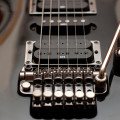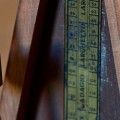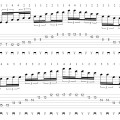Sooner or later we all get stuck. It’s completely natural, development occurs in steps, not along a continuous smooth curve. For me it’s often something mental – I suddenly realize something I never did before. Some such early epiphanies have been that you have to mute the strings you’re not playing on a distorted guitar (string dampening) and that bends do need to hit their target note. Other times it’s a physical thing, suddenly your fingers can just play stuff they couldn’t before.
So, what to do when your at a plateau and that next step doesn’t seem to want to take place?
1. Get a guitar teacher
After playing for two years, teaching myself by reading lessons, watching videos and just practicing I felt really stuck. Even though i’d gotten farther than I ever thought I would I felt stuck and had started to wonder if that was as far as I could go.
After mustering up some courage I went out and looked for a teacher (hey, it’s not easy being a 35 yo beginnner). Through one of my guitar forums I found the amazing Kristian Niemann of Therion fame. Slightly older than me and infinitely more skilled and experienced he took me a bunch of steps up the development ladder.
Even more important, apart from teaching me a lot of stuff I actually got a bit less uneasy playing in front of other people, especially other musicians. From there I started posting clips on forums etc. and the whole stage fright thing went pretty much away (probably until I put myself on a real stage).
2. Play with other people
The most common advice I’ve gotten on how to grow musically is to play with others. This might seem daunting at first – where do I find a band? It’s tricky to find a band that plays the music you want to play, and even more so when you want a band good enough to help you develop and still be willing to have you.
I found it extremely difficult because of age – most beginner bands’ members are in their late teens with unlimited free time to spend. My free time is scarce and I’m approaching 40. Don’t give up though, there are people out there in the same situation as you (whatever that may be). Also remember it doesn’t have to be a complete band, I ended up with another guitarist with the rest of the band consisting of backtracks. But I learned a lot from that.
3. Record yourself
I started recording early on, and it’s helped me enormously. When you play it usually sounds great. It’s like your brain can’t concentrate on playing and listening at the same time, so it sort of smooths over mistakes. When you listen to a recording of yourself you are focused on listening, and then you can hear everything very clearly.
The thing here is not to get stuck in the critical phase. Be very honest with yourself and your performance, identify what you have to work on. But then also be very generous. Keep your recordings and go back and compare. You’ll see how much you’ve developed in a year or whichever timeframe you chose. Revel in it and is it to boost your motivation. Also share your stuff online – find forums with a friendly culture where you can get positive feedback.
4. Learn some new music theory
One way to get stuck is to rehash the same licks over and over. The magical one-size-fits-all super scale pentatonic minor over time becomes old, and so does your standard licks. Learn a new scale (how about harmonic minor) and try analyze some songs using it. If scales isn’t a problem, maybe try to get into a new time signature. Or learning a song from a different genre than you usually play.
5. Focus
I find that sometimes my practicing loses its attention span. I just noodle around, or I play pieces of songs that I know. That’s fine at times, but when you practice without focus you’re not going push yourself to a new level. At these times I just man up and choose one short-time goal and spend all my practice time on that for a while. Typical goals:
- Learn a cover song properly (all of it).
- Practice a technique – like doing only hammer-ons and pull-offs for a week. This can be excruciatingly boring, but if you’ve ever done this you know that it’s does amazing things with your playing.
- Finish a song you’re working on.
- Make a recording.
Another suggestion I’ve read is putting the guitar away for a while. That’s probably relevant if you practice a lot. For me, those kinds of breaks occur all the time anyway.
As always, share your own best tips in the comments!





